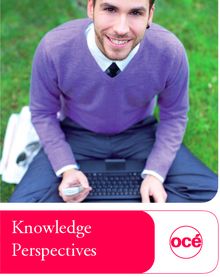
Diese Seite ist auf Deutsch nicht verfügbar.
Sprache wählen
Niederländisch,
Englisch
I am invited as a key-note speaker at the Symposium “Knowledge integration in an organizational network, a human and technological perspective" on March 29th 2010 in Venlo.
In a knowledge economy high performing firms succeed through continuous improvement and regular, radical innovation of their work processes, products and services. Their learning and development are engrained in the day-to-day work processes, not only in R&D departments but also in the operating units. Increasingly these workers are connected in dynamic networks of team members, internal as well as external fellow workers, clients, partners and suppliers, all in an ever changing environment.
All this requires:
- a fresh approach towards employees as knowledge workers,
- the creation of attractive workplaces that act as encouraging learning environments,
- and leadership that recognizes, nurtures and retains talents, that pursue a sense making vision.
Rethink the roles of the human factory and technological infrastructure
Therefore, we should rethink the roles of the human factor in our company and its technological infrastructure, that enables communication, exchange of information, free flow of ideas, and that also invites to participate. Inevitably questions will raise on how characteristics of self directing and personal autonomy relate to a unifying corporate mission, strategy, operating procedures, rules and security regulations.
In this symposium we will explore the implications of knowledge integration in an organizational network from a human as well as a technological perspective. All participants are invited to jointly investigate the dilemmas a company in transition needs to face.
The human aspect: Knowledge integration: connecting learning,social capital and innovation
In my key-note address I will explore the characteristics of learning environments that support knowledge productivity and that facilitate innovation. Intriguing questions are how leadership and management can create a learning climate that is conducive for learning, building human capital as well as social capital for gradual improvement, radical innovation and sustainable development of organizations.
The technological aspect
Erik Duval is also key-note speaker and professor at the Leuven- University (Belgium), the computer science department. Thanks to the technological evolution, media and information are growing exponentially. That is great, because this evolution is replacing problematic scarcity with abundance. However, the resulting information-tsunami has become a problem in itself. In this keynote, we will discuss how massive hyper-personalization can leverage the technological affordances for individuals and organizations alike.
For more information you can download the program.